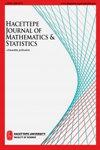On a minimal set of generators for the algebra $H^*(BE_6; \mathbb F_2)$ as a module over the Steenrod algebra and applications
IF 0.7
4区 数学
Q2 MATHEMATICS
引用次数: 0
Abstract
Let $\mathcal P_n \cong H^{*}\big(BE_n; \mathbb F_2 \big)$ be the graded polynomial algebra over the prime field of two elements $\mathbb F_2$, where $E_n$ is an elementary abelian 2-group of rank $n,$ and $BE_n$ is the classifying space of $E_n.$ We study the {\it hit problem}, set up by Frank Peterson, of finding a minimal set of generators for the polynomial algebra $\mathcal P_{n},$ viewed as a module over the mod-2 Steenrod algebra $\mathcal{A}$. This problem remains unsolvable for $n>4,$ even with the aid of computers in the case of $n=5.$ By considering $\mathbb F_2$ as a trivial $\mathcal A$-module, then the hit problem is equivalent to the problem of finding a basis of $\mathbb F_2$-graded vector space $\mathbb F_2 {\otimes}_{\mathcal{A}}\mathcal P_{n}.$ This paper aims to explicitly determine an admissible monomial basis of the $ \mathbb{F}_{2}$-vector space $\mathbb{F}_{2}{\otimes}_{\mathcal{A}}\mathcal P_{n}$ in the generic degree $n(2^{r}-1)+2\cdot 2^{r},$ where $r$ is an arbitrary non-negative integer, and in the case of $n=6.$ As an application of these results, we obtain the dimension results for the polynomial algebra $\mathcal P_n$ in degrees $(n-1)\cdot(2^{n+u-1}-1)+\ell\cdot2^{n+u},$ where $u$ is an arbitrary non-negative integer, $\ell =13,$ and $n=7.$ Moreover, for any integer $r>1,$ the behavior of the sixth Singer algebraic transfer in degree $6(2^{r}-1)+2\cdot2^r$ is also discussed at the end of this paper. Here, the Singer algebraic transfer is a homomorphism from the homology of the Steenrod algebra to the subspace of $\mathbb{F}_{2}{\otimes}_{\mathcal{A}}\mathcal P_{n}$ consisting of all the $GL_n(\mathbb F_2)$-invariant classes. It is a useful tool in describing the homology groups of the Steenrod algebra, $\text{Tor}^{\mathcal A}_{n, n+*}(\mathbb F_2,\mathbb F_2).$代数$H^*(BE_6;\mathbb F_2)$作为Steenrod代数上的一个模块及其应用
让 $\mathcal P_n \cong H^{*}\big(BE_n; \mathbb F_2 \big)$ 是两个素数域上的次多项式代数 $\mathbb F_2$,其中 $E_n$ 一个初等阿贝尔2群是秩的吗 $n,$ 和 $BE_n$ 分类空间是 $E_n.$ 我们研究 {\it 命中问题}是由弗兰克·彼得森建立的,目的是找到多项式代数的最小生成子集 $\mathcal P_{n},$ 被看作是mod2 Steenrod代数上的一个模块 $\mathcal{A}$. 这个问题仍然无法解决 $n>4,$ 即使在电脑的帮助下 $n=5.$ 通过考虑 $\mathbb F_2$ 作为一个小问题 $\mathcal A$-模块,那么命中问题就等价于求的基的问题 $\mathbb F_2$-梯度向量空间 $\mathbb F_2 {\otimes}_{\mathcal{A}}\mathcal P_{n}.$ 本文的目的是明确地确定一个可容许的单项基 $ \mathbb{F}_{2}$-向量空间 $\mathbb{F}_{2}{\otimes}_{\mathcal{A}}\mathcal P_{n}$ 在一般程度上 $n(2^{r}-1)+2\cdot 2^{r},$ 在哪里 $r$ 是任意的非负整数,在的情况下 $n=6.$ 作为这些结果的应用,我们得到了多项式代数的维数结果 $\mathcal P_n$ 在程度上 $(n-1)\cdot(2^{n+u-1}-1)+\ell\cdot2^{n+u},$ 在哪里 $u$ 是一个任意的非负整数, $\ell =13,$ 和 $n=7.$ 此外,对于任何整数 $r>1,$ 第六种辛格代数转移的度行为 $6(2^{r}-1)+2\cdot2^r$ 论文的最后也进行了讨论。在这里,Singer代数迁移是从Steenrod代数的同态到的子空间的同态 $\mathbb{F}_{2}{\otimes}_{\mathcal{A}}\mathcal P_{n}$ 由所有的 $GL_n(\mathbb F_2)$-不变类。它是描述Steenrod代数的同调群的一个有用的工具, $\text{Tor}^{\mathcal A}_{n, n+*}(\mathbb F_2,\mathbb F_2).$
本文章由计算机程序翻译,如有差异,请以英文原文为准。
求助全文
约1分钟内获得全文
求助全文
来源期刊
CiteScore
1.70
自引率
0.00%
发文量
100
审稿时长
6-12 weeks
期刊介绍:
Hacettepe Journal of Mathematics and Statistics covers all aspects of Mathematics and Statistics. Papers on the interface between Mathematics and Statistics are particularly welcome, including applications to Physics, Actuarial Sciences, Finance and Economics.
We strongly encourage submissions for Statistics Section including current and important real world examples across a wide range of disciplines. Papers have innovations of statistical methodology are highly welcome. Purely theoretical papers may be considered only if they include popular real world applications.

 求助内容:
求助内容: 应助结果提醒方式:
应助结果提醒方式:


